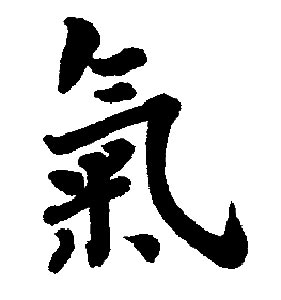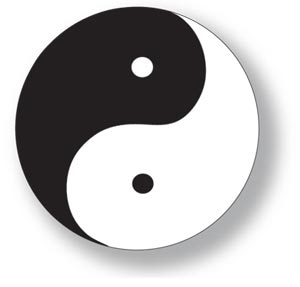FEW CONCEPTS TO UNDERSTAND CHINESSE MEDECINE
What Is Qi? (and Other Concepts)
What is a system in Tradicional Chinesse Medecine?
A system is comprised of everything that creates and sustains it. Everything is interconnected and interdependent. If all of the parts of a system are in harmony with one another, then the whole system is in harmony. Disturb one thing and you create a disturbance that ripples through the whole system.This principle applies to any and all systems. For example, it applies as equally to a human being as it does to a family, community, or the environment. So we must take care to consider our actions and to take things as a whole.
What are the fundamental concepts?
Two concepts that are unique and fundamental to Chinese medicine are Qi (usually translated as "vital energy") and Yin and Yang (the harmony of all the opposite elements and forces that make up existence). These two concepts form what we might call the "roots" of Chinese medicine.Springing from these roots are the basic principles and theories about the dynamics of Qi and yin and yang, which form the "stems" of Chinese medicine.
And resting on these principles is the rest of TCM theory and application, such as the causes of patterns of disharmony, which form the "branches."
What is Qi?
 TCM starts with the concept of Qi (pronounced "chee").
TCM starts with the concept of Qi (pronounced "chee").- Qi is energy in the very broadest sense possible.
- Qi is universal.
- Qi embraces all manifestations of energy, from the most material aspects of energy (such as the earth beneath your feet, your computer, and flesh and blood) to the most immaterial aspects (light, movement, heat, nerve impulses, thought, and emotion).
Qi is in a state of continuous flux, transforming endlessly from one aspect of Qi into another. It is neither created nor is it ever destroyed; it simply changes in its manifestation.
In order to talk about the relationships between the various aspects and manifestations of Qi within a given context, Chinese philosophy employs the concept of yin and yang.
A VIDEO TO LEARN MORE QI
What are Yin and Yang?
 In
the Chinese perspective, given the importance of "taking everything as a
whole," all things are relative. A thing can be understood only in
relation to something else. This is the essential idea behind the use of
the terms yin and yang.
In
the Chinese perspective, given the importance of "taking everything as a
whole," all things are relative. A thing can be understood only in
relation to something else. This is the essential idea behind the use of
the terms yin and yang.Yin and yang are terms used to describe relative opposite qualities or manifestations of Qi. If yin is form, then yang is function. If yin is material, then yang is immaterial.
-
Yin refers to aspects or manifestations of Qi that are relatively
material, substantial, condensing, solid, heavy, descending, cold,
moist, cooling, dark, passive and quiescent.
-
Yang refers to aspects or manifestations of Qi that are relatively
immaterial, amorphous, expanding, hollow, light, ascending, hot, dry,
warming, bright, aggressive, and active.
What is the relationship between Qi and Yin and Yang?
Everything that is yin contains some element of Yang, and everything that is yang contains some element of yin. There is nothing so solid or material (Yin) that does not contain some energetic vibration (Yang), and nothing so kinetic or immaterial (Yang) that does not also contain some material substance (Yin). Even light, so Einstein tells us, has mass.Yin and yang are continuously changing; they constantly adjust to one another, and are endlessly transforming one into the other in an eternal dance of becoming. This wonderful concept of change is beautifully illustrated in the simple image of the "yin-yang symbol."
When all of the yin and yang aspects of Qi are in harmony with one another, there is health, wellbeing and contentment. When yin and yang are in disharmony, when there is too much or too little of one aspect of Qi relative to another, then there is illness, pain and suffering.
A VIDEO TO LEARN MORE ABOUT YIN AND YANG
Deficiency
 This
usually refers specifically to a deficiency of one or more of the
manifestations of Qi within the body (see "vital substances"). But it
can also refer more generally to an insufficiency of any of the things
that would normally sustain and nourish us in life, such as food,
warmth, shelter, physical and mental stimulation, the interaction with
other living beings, and, of course, love.
This
usually refers specifically to a deficiency of one or more of the
manifestations of Qi within the body (see "vital substances"). But it
can also refer more generally to an insufficiency of any of the things
that would normally sustain and nourish us in life, such as food,
warmth, shelter, physical and mental stimulation, the interaction with
other living beings, and, of course, love.To make an appropriate response to the ever shifting dynamics of yin and yang, we must have a sufficient amount of Qi. Since most of the Qi we use in life is extracted from what we eat and the air that we breathe, Chinese medicine places considerable importance upon an adequate and appropriate diet of fresh, high quality food, and the opportunity and ability to breathe good, clean air.
Excess
 This
refers to the presence of something that is in some way detrimental to
our nature but can also (and this is more commonly the case for many of
us) refer to or an overabundance of something relative to our need for
it. Examples of excess factors might include:
This
refers to the presence of something that is in some way detrimental to
our nature but can also (and this is more commonly the case for many of
us) refer to or an overabundance of something relative to our need for
it. Examples of excess factors might include:- Environmental toxins, such as pollution or toxic chemicals
- Excessive environmental influences, such as too much he at, cold or humidity;
- Dietary excess
- Excessive emotions (i.e. too much worry and pensiveness, too much sadness, grief, fear, anger, even too much joy can be harmful)
- Excessive physical activity
- Too much thinking
- Excessive sexual activity.
Avoiding disharmony
To
avoid disharmonies due to deficiency or excess, we must have sufficient
mindfulness, and mental clarity to perceive the world and determine our
needs. And we must determine how we can meet those needs without
creating new problems for ourselves or creating disharmony in the world
around us.
An unquiet or disordered mind (i.e. a distracted mind or a mind engaged in perpetual multi-tasking, a mind filled with worry, or a mind just plain "stressed out") could be considered to be not only the result of disharmony but also the potential cause of further disharmony.
This is why the cultivation of a quiet mind is so important in the cultivation of health and wellbeing. Meditation, tai chi, Qi Gong and other Yogic practices have always been central in the practice of Chinese medicine and most TCM practitioners would agree that the cultivation of a quiet mind is the single most important thing we can do for ourselves.
An unquiet or disordered mind (i.e. a distracted mind or a mind engaged in perpetual multi-tasking, a mind filled with worry, or a mind just plain "stressed out") could be considered to be not only the result of disharmony but also the potential cause of further disharmony.
This is why the cultivation of a quiet mind is so important in the cultivation of health and wellbeing. Meditation, tai chi, Qi Gong and other Yogic practices have always been central in the practice of Chinese medicine and most TCM practitioners would agree that the cultivation of a quiet mind is the single most important thing we can do for ourselves.




Commentaires
Enregistrer un commentaire